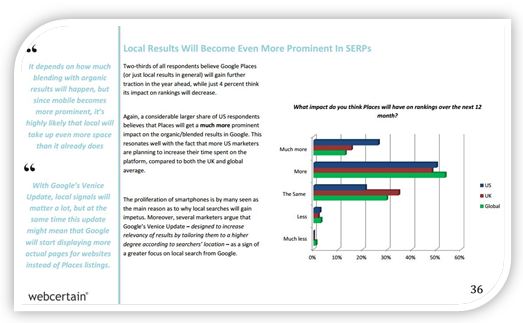In a response to the ever-growing importance of local search, Webcertain has compiled a 45-page report on the global impact of Google Places (now Google+ Local). The exploratory study, which surveyed global marketers in 17 countries worldwide, can now be accessed free of charge via Webcertain’s Global Central System (see how to sign up at the bottom of this post).
With the far majority of respondents (70%) primarily operating in either the UK or US, the study investigates the similarities and differences between those two markets and compares them to the global average.
Pivotal changes, however, have taken place in the local SEO sphere since the survey was carried out. In short, Google’s migration of about 80 million Places pages into Google+ Local pages basically means that Places is history.
Why should you still care to read this report?
- Obviously, the migration to Google+ has its implications on local SEO, but current best practices are not entirely flushed down the drain overnight. This report provides many insights into what is considered most important for ranking in local searches, as well as devotes an entire section to Google+ Local at the end.
- The importance of having a local listing according to business sector/industry is identified. Google+ Local will not dramatically change this.
- Furthermore, knowing where we are coming from is fundamental in understanding where we are going and how to best approach this transition. In this regard, the report provides a comprehensive view into the importance of a wide range of ranking factors and how these differ globally, as well as surveys the financial impact of Places before finally moving on to looking at the future of local search.
A few key findings
- Having a local listing is considered most important in the accommodation sector, closely followed by entertainment (incl. restaurants, bars, etc.) and consumer services (e.g. hairdresser, dentist).
- With an average global score above 9 on a 10-rating scale, marketers find NAP consistency across the web absolutely imperative to ranking, while customer reviews likewise are deemed very important (scoring 8.21 out of 10) for ranking in local searches.
- Off-page factors like volume of citations and quality of inbound links are considered much more important by German marketers, compared to their American and British counterparts.
- 77% of all marketers surveyed state that customer reviews have either high or very high impact on CTRs.
- Almost 70% believe local results will become even more prominent in Google SERPs in the year ahead, while just 4% think its impact on rankings will decrease. Marketers in the US in particular are confident that local results will influence rankings much more over the following 12 months.
How to access the report
- The survey can be accessed via Webcertain’s Global Central system – click here to sign up (it is free to do so).
- Under “Why I’d Like A Login”, write “MLS audience”
- You will receive an email with details of how to login – and once you are in, click the “Insights” tab and type in “Local Search” in the search box.
- Add it to your insights and you will find the “Google Places Report – A Global Exploratory Study Into Local Search”. There you have it!
- In addition to this report, signing up for Global Central will give you access to a vast database of international SEO and social media articles, reports, presentations etc. – which are all free and regularly updated.









2 responses
Hi Immanuel
I can’t sign up. How exactly do I sign up?
Hi Chrys,
If the link doesn’t direct you to the sign-up form, please click the tab that says “Request an Invite” and follow the steps listed above in the article.